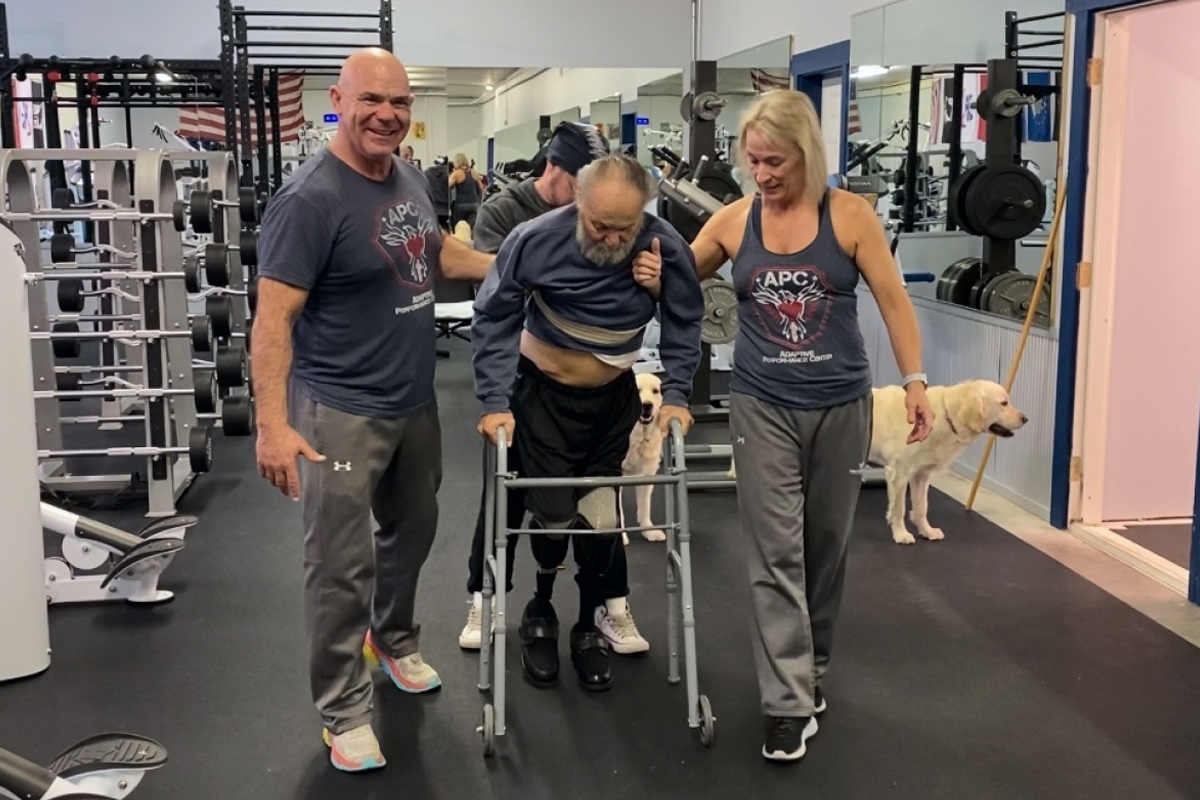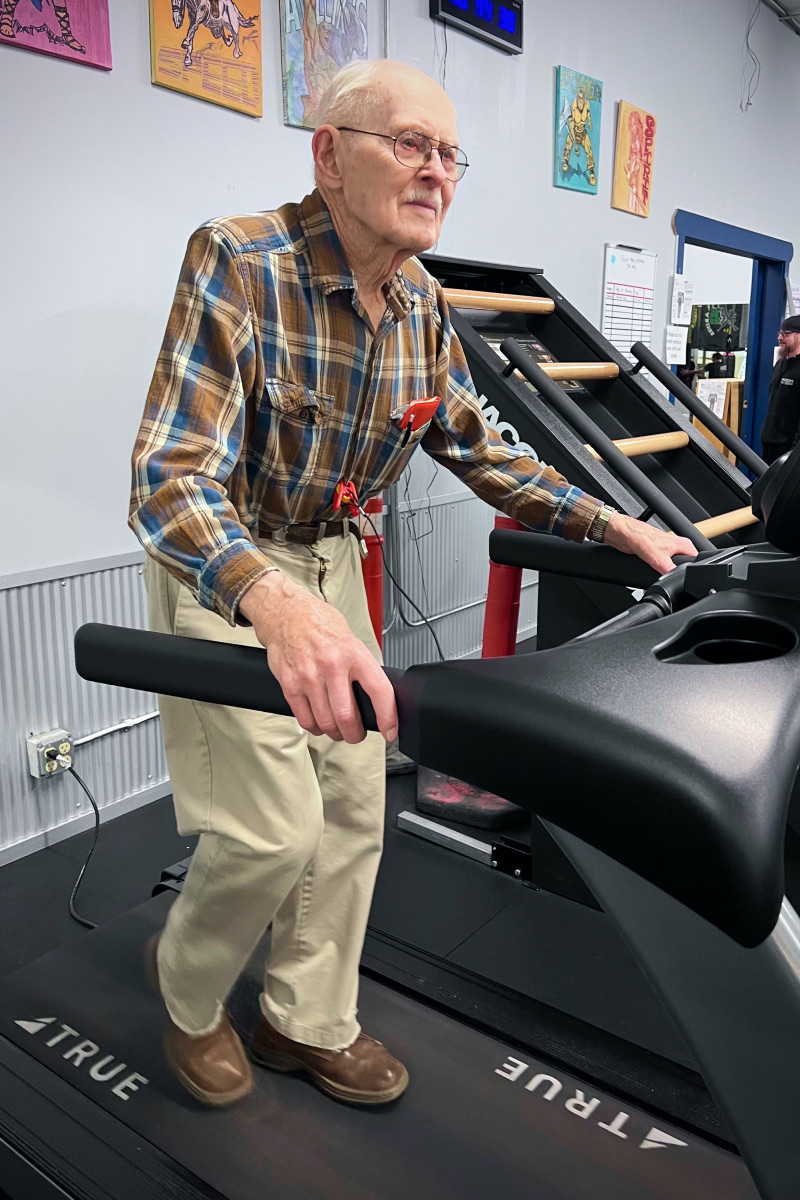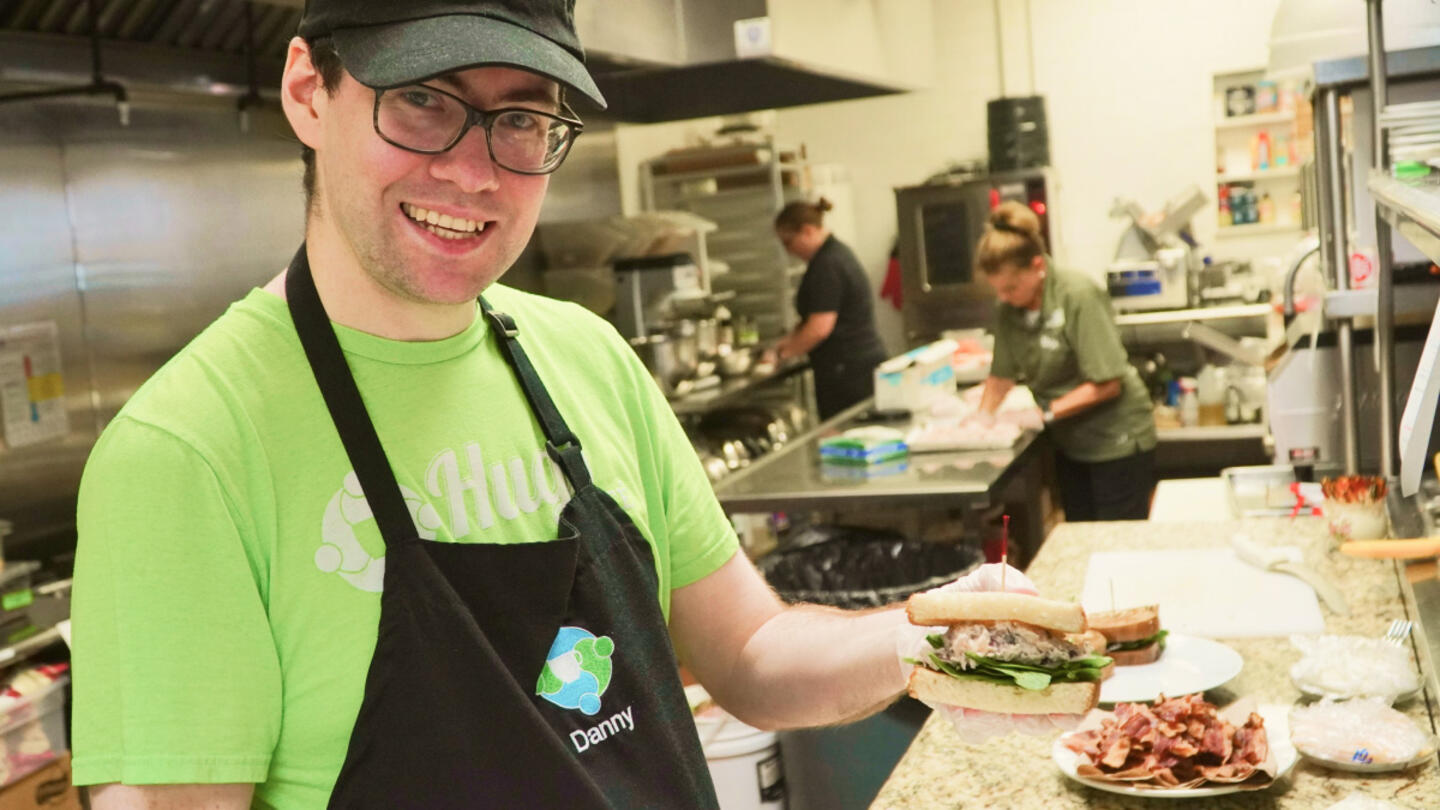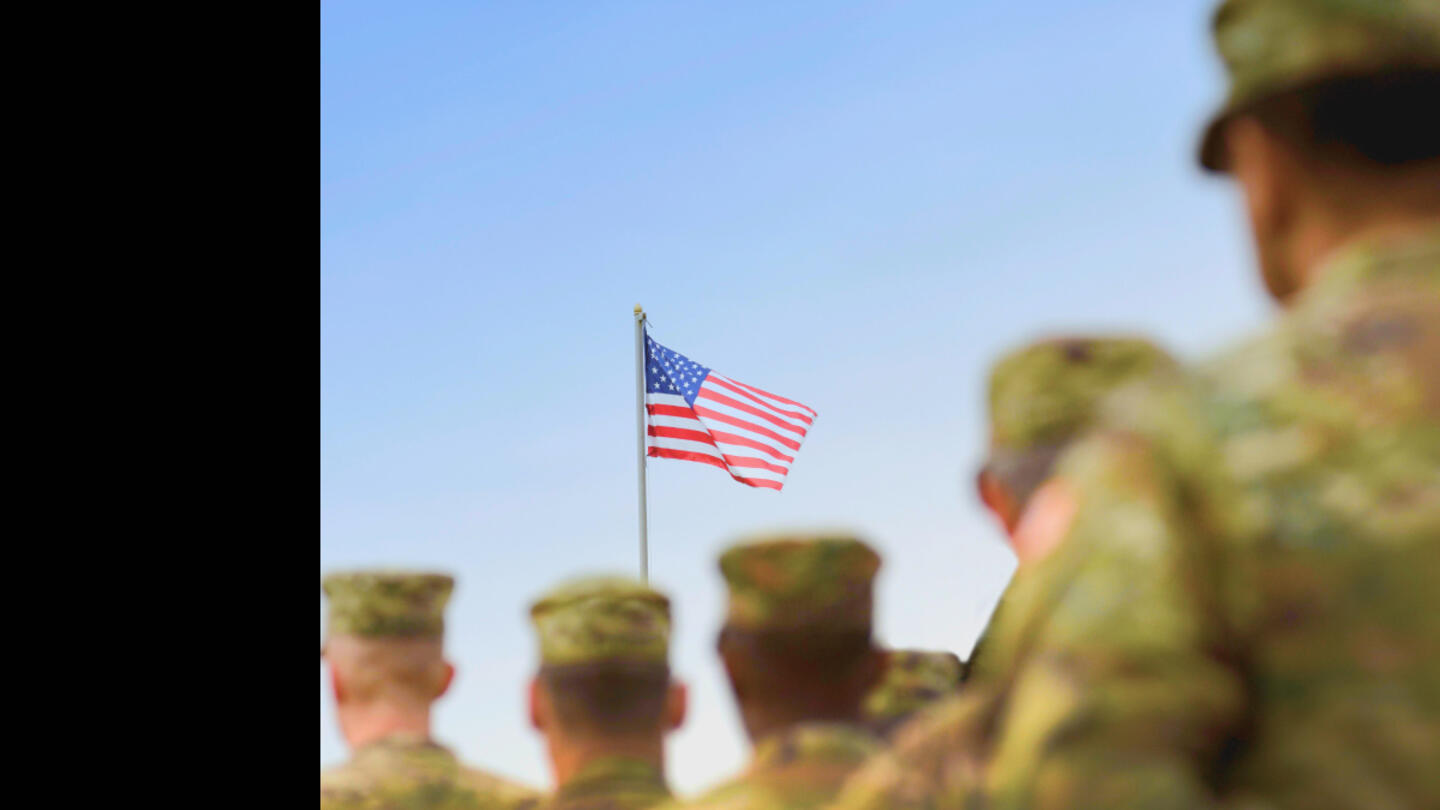Karen Pearson knows firsthand the struggles many veterans can go through when they return home to civilian life: Her former husband of 22 years was deployed just four days after 9/11. When he returned, “he was just different,” she said. “Over the course of several years, he just continued to get worse — suicidal, homicidal.”
He wasn’t alone. Pearson is a mental health professional. She said she “started seeing that there [were] some really, really, really big issues with these service members coming back, lots of mental health issues.”
She left her private practice to teach fitness and yoga classes, both of which she said changed patients faster than talk therapy. Once she met Mitch Crouse, the two began volunteering with the local National Guard to improve members’ physical and mental readiness, and then it all came together.
A car wreck had left Crouse with migraines, dizziness, and vertigo, which he only knew to treat with heavy medication. “I mean, I was chewing on 20, 30 ibuprofen a day,” he said. When a friend encouraged him to try working out at a gym as both physical and mental therapy, it changed everything.
Pearson and Crouse teamed up to found Adaptive Performance Center, a gym specifically geared toward veterans. It opened in March 2020, just two weeks before the Covid pandemic hit. Despite the pandemic, 46 veterans joined in just 11 days.
“If that wasn’t a sign that the veteran community was starving to be in a community — to have 46 people that don’t know us from Adam roll in, in 11 days,” Pearson said.
Many veterans returning to civilian life can struggle to find community, purpose, and direction. Without these essential foundations, they face dramatically higher rates of addiction, homelessness, and suicide compared to the general population. This struggle prevents them from leading fulfilling lives and fully engaging with their loved ones and peers. While caring for veterans should be a national priority, the government's current approach falls short of delivering the support they need.
That’s why APC is more than just a gym. It includes an essential ingredient that many programs helping veterans reintegrate into society lack: community. By creating a space for active and former military personnel to connect, APC helps these veterans find belonging and purpose. It’s a powerful blueprint for empowering veterans everywhere.
When veterans’ social selves flourish, their physical selves follow
Although it’s a gym, when a member walks into APC, the first thing they see isn’t equipment: It’s a huge, communal lounge. That’s by design.
The entrance to the location in Billings, Montana, is filled with a pool table, a puzzle table, sofas and chairs, and a coffee station. Pearson described the facilities as “a community center with a gym attached to it.”
“A lot of these veterans, some of them have been in their home for 20, 30, 40 years,” Pearson said. “They don’t go out into the community. So when they come in, they discover that they still have the ability to talk [to others]. It is not uncommon for them to sit for two, three, or four hours, talking with each other and with us.”
Take Don, a Vietnam veteran and double amputee. When he first entered APC, he had not walked in three years. He began working with Crouse on a modified training routine that accommodated his disability — and, more importantly, building relationships with fellow veterans.
These connections became so central to Don’s life that when he finally received prosthetic legs, he didn’t want to walk for the first time inside a physical therapist’s office. He wanted to take his first steps at APC.
The day Don got his new legs, he came to APC and walked 85 feet.
“There was not a dry eye in the place,” Pearson said. “There was another Vietnam veteran who was on the rowing machine, who got up, came over, stood at attention, and snapped him a salute.”
Not too long after, Don passed away in his sleep. But through the community and rehabilitation he had found at APC, by the time he died, Pearson said, he did so fulfilled.
“He fully realized something he did not think would ever [happen] in his life again,” Pearson said. “As hard as it [was] to lose [him], it still makes my heart happy and still makes me smile that he accomplished what he wanted to do before he died. He walked. He did it.”
To this day, Don’s widow regularly visits APC and remains a supportive member of the veterans’ extended community there.

Community doesn’t just provide comfort and a social life to veterans: It’s a powerful tool that can enact real, tangible change. Community can be transformational and essential in helping people pursue mental health solutions, whether for veterans, people struggling with addiction, or sexual trauma survivors.
According to APC, 75% of members report “highly reduced” instances of suicidal thoughts after one month of membership, 55% say their motivation for leaving the house and socializing has “increased significantly,” 88% credit APC with having an “extremely positive” impact on their mental health, and 78% say the nonprofit provides “lots of opportunity” to take part in a veteran community.
“It’s like the community side is their pre-workout,” Pearson said. “Before they go and work out, they have to stand at the counter and talk for an hour. And after their workout, they come out and talk for a couple [more].”
Community transforms veterans' physical and mental health by providing a like-minded group that understands their unique challenges, struggles, and hopes. This shared understanding enables solutions tailored to their real needs, offering personalized support rather than ineffective, one-size-fits-all approaches.
Sign up for the Strong & Safe Communities newsletter for stories, ideas, and advice from changemakers working with their neighbors to address the biggest problems we face.
For physical health, APC has created a safe gym space to accommodate many veterans’ injuries and disabilities. This includes rubber-coated weights, thicker floors, and soundproofing.
But physical health is just the beginning. Pearson and Crouse have worked to identify “holes” in veteran care, including their social and mental stability.
“What that allowed us to do was fill those holes,” Pearson said. “When you look at risk factors that lead to suicide, we have a position to help with every one of those things.”
To that end, in addition to personal trainers, APC offers occupational therapy, acupuncture, and massages. A peer mentor plans social activities both on- and off-site. A veteran liaison advocates for specific needs, such as combating food insufficiency and assistance accessing stable housing or medical care through the VA system.
“Now they have a place where it’s like-minded people, so the people know where they’ve been, and they can talk about these things,” Pearson said. “That [makes] a big difference when you’re going through the whole healing process.”
Helping veterans rebuild their lives means stronger communities for everyone
Since its inception, APC has served over 1600 veterans in its Billings location and nearly 700 in its second location in Helena, Montana, which opened in 2023.
“Success” looks different for every veteran. It often has nothing to do with numbers. For many, success “is really just the talking because some of them haven’t done it for so long,” Pearson said. “[For some, making] it through the door is a huge success. … The success stories range from ‘I lost weight,’ ‘I gained muscle,’ ‘I got off of a bunch of medications that the VA had me on,’ ‘My sister called, who I haven’t talked to in 10 years, and we had a conversation.’”

In helping veterans repair their physical, mental, and social well-being, APC isn’t just healing injuries. It’s enabling individuals to pursue happier, fuller, and more meaningful lives. When that happens, it reverberates throughout communities, which benefit from more members who are ready to share their full selves and gifts — whether or not they have a close connection with a veteran.
“The further out the fingers reach, the more veterans we are able to touch, the more they [then] go out [into their communities],” said Crouse. “They’re out in the community now doing things, and they make themselves available for each other, even if it’s somebody they haven’t met before.”
When veterans are empowered to help themselves, they become motivated to support others — at APC, at home, in the workplace, and beyond. All it takes are those first steps through APC’s door to trigger a domino effect of growth in the community.
“That evolution of success starts to have a ripple effect into other areas of their lives,” Pearson said. “It’s very powerful to watch that happen.”
If you or someone you know is in crisis, contact the National Suicide Hotline by dialing 988 or 911 if you need immediate help.
The Adaptive Performance Center is supported by Stand Together Foundation, which empowers individuals to reach their full potential through community-driven change.
Learn more about Stand Together’s efforts to build strong and safe communities and explore ways you can partner with us.

People with disabilities want meaningful work — and Hugs Cafe is making it happen.

At this ‘resort,’ children with intellectual disabilities are seen as gifts to be celebrated and loved.

Veterans experience loss when leaving service. Could this be key to understanding their mental health?

The Grammy-nominated artist is highlighting the stories we don’t get to hear every day.
